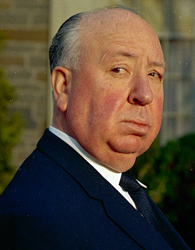Known for thrillers like “Rear Window” and “The Birds,” Alfred Hitchcock is a master of bringing audiences to the edge of their seats.
Alfred Hitchcock’s Early Days
Hitchcock was born in London on August 13, 1899. His parents were strict, and according to Biography.com, Hitchcock said he was “lonely and sheltered” as a child. His father once had him locked up in a jail cell for 10 minutes to teach him a lesson. But Alfred used the experience to his advantage, often using his police phobia as film inspiration later in his career.
Alfred attended a Jesuit preparatory school called St. Ignatius College in an electrical engineering program, and then began coursework at the University of London. However, his education was cut short when Alfred had to begin working to help support his family. He started as a technical clerk for a manufacturing company, but willed his way up the ladder to the advertising department.
In 1923, he’d become a scenario writer for Gainsborough Pictures in Islington, England, but it hadn’t come without a fight. Two years earlier, when he heard that the Famous Players-Lasky Company planned to build studios in London, Hitchcock decided to fix up film title cards, which he found unattractive, to impress the big wigs. However, to get his finished work to company execs, Hitchcock first had to convince an “army of secretaries and assistants.”
His first suspense film, “The Lodger,” was released in 1926, and wholly convinced critics and audiences. The story told of a man mistaken for Jack the Ripper.
Hitchcock’s Notable Accomplishments
Hitchcock’s first sound film, “Blackmail,” was released in 1929. He used a technique called “subjective sound,” which distorted some words to emphasize others, building suspense.
His 1934 film, “The Man Who Knew Too Much,” was noteworthy for establishing Hitchcock’s preference for delving into family relationships while telling a suspenseful story.
The 1959 film “North by Northwest” is considered one of Hitchcock’s best, from script to score to cast, including stars Cary Grant and Eva Marie Saint. The “quintessential chase movie” displayed Hitchcock’s trademarks: “ingenious shots, subtle male-female relationships, dramatic score, bright Technicolor, inside jokes, witty symbolism and above all masterfully orchestrated suspense.”
Sources in this Story
- Biography.com: Alfred Hitchcock
- HitchcockTV: Alfred Hitchcock Brief Biography
- IMDb: Alfred Hitchcock
- The Age: Hitchcock best Oscar loser
- The New York Times: Hitchcock at 100
The Rest of the Story
Hitchcock was nominated for several Oscars in the Best Director category, but never won, prompting some to call him the best director who never won an Academy Award.
With his wife, film editor Alma Revile, Hitchcock had one daughter, Patricia, who showed up in some of his most famous movies. Hitchcock died at age 80, on April 29, 1980.
In honor of Hitchcock’s 100th birthday, The New York Times created a collection that includes clips and reviews of his movies, interviews with the director, and other essays.
This article was originally written by Sarah Amandolare; it was updated July 10, 2017.











